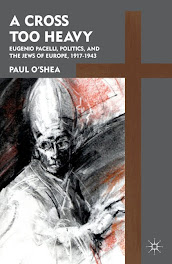The Cardinal in charge of Christian unity at the Vatican has promised that the Vatican archives for the entire period of the Second World War, when the Church has been accused of failing to do enough to help the Jewish people, will be opened soon for scholarly research.
Cardinal Walter Kasper, head of the Council for Christian Unity, also warned that cutting itself off from its Jewish roots for centuries weakened the Church so badly that it could only offer a "feeble" resistance against persecution of the Jews.
He said that Israel without the Church was in danger of becoming "too particularistic and reclusive", but that the Church without Israel was "in danger of losing its historical grounding and becoming ahistorical and Gnostic."
The Cardinal was speaking at Liverpool's Hope university in an address described by the Archbishop of Liverpool, the Most Rev Patrick Kelly as one that had prompted in him "a change in heart and mind."
Addressing one of the most sensitive and difficult aspects of Jewish-Christian relations, the papacy of Pius XII, described as "Hitler's Pope" by the influential British author and academic John Cornwell, Cardinal Kasper promised the full archives for the period covered by the Second World War would soon be opened to scholars at the Holy See in Rome. "We have nothing to hide," he said. "We do not need to fear the truth."
Describing the state-sponsored organized murder of six million European Jews as "the absolute low point" in the history of anti-Semitism he nevertheless said the Holocaust could not be attributed to Christianity as such, since it also had clear anti–Christian features.
But he added: "However, centuries–old Christian theological anti–Judaism contributed as well, encouraging a widespread antipathy for Jews, so that ideologically and racially motivated anti–Semitism could prevail in this terrible way, and the resistance against the outrageous inhuman brutality did not achieve the breadth and clarity that one should have expected."
Defending the record of Pius XII, a candidate for canonisation who was Pope from 1938 to 1958, while Rome was under the heel of Mussolini and later occupied by Germany, he said the contemporary assessment of his Pontificate was rather positive.
"The New York Times, which is not known as a Church–oriented newspaper, had already in 1941 published an editorial where it spoke of the Pope as the only voice in the silence and in the dark with the courage to raise his voice," the Cardinal said. "After the deportation of more than 1000 Jews from Rome - only 15 survived - in October 1943 he ordered a general Church asylum in all convents and ecclesiastical houses, including the Vatican and Castel Gandolfo. According to authoritative estimates, about 4500 Jews were hidden."
He said there were still Jews today who defended Pius as well as Catholic authors who criticised him and acknowledged that the main problem was access to the sources.
He promised that the archives for Pius XII's papacy would be online within six years. Since 2003 access has been available up until the end of the Pontificate of Pius XI in 1939, a period in which the future Pius XII was Secretary of State.
"The material which is already accessible now proves that Pius XII was at no time Hitler’s Pope. On the contrary, he was the closest cooperator of Pope Pius XI in the publication of the encyclical Mit brennender Sorge (“With burning anxiety", 1937), which was a fervent condemnation of Nazi race ideology.
"The Archives are now working under intense pressure on the project to prepare access to the Pontificate of Pius XII, but the registration and preparation of millions of documents in a due professional way needs time and will be completed in about five or six years, after which general access for scholars will be granted."
Eleven volumes with documents of the Holy See have already been made public and recently many other sources have become available.
The Cardinal said: "Pius XII was not a man of prophetic gestures; he was a diplomat and decided not to be silent but to be moderated in his public statements because he knew that stronger words would improve absolutely nothing; on the contrary, they would provoke brutal revenge and worsen the situation. Therefore he decided not so much to act through words but to help practically as much he could. In this way alone in Rome he saved thousands of Jewish lives."
Acknowledging another area of difficulty, proselytism, he continued: "Unfortunately there has been a history of forced conversions of Jews." The Church no longer endorsed evangelism of the Jews, he said. "In contrast to some fundamentalist evangelical movements which undertake missionary work, the Catholic Church sponsors no specific institutional missionary work aimed at Jews."
Archbishop Kelly afterwards described the address as "a highly significant contribution" to relations between the two faiths. He said: "Cardinal Kasper's address prompted in me personally, a change in heart and mind. It demanded a new way of thinking and so, of acting."
Earlier this month, Cardinal Kasper, a theologian and linguist, was honoured in the US for "extraordinary" achievements in interfaith dialogue. The American Jewish committee presented him with the prestigious Isaiah Inter-religious Award at its annual meeting in Washington DC.






No comments:
Post a Comment
You are welcome to post a comment. Please be respectful and address the issues, not the person. Comments are subject to moderation.